rk3568开发板4.0 Release版本cpu点屏过程总结
基于4.0Release版本和rk3568的开发板进行CPU点屏。 建议:使用未作修改的代码完成以下修改,改完之后再进行编译。 关闭GPU点屏功能 路径: foundation\graphic\graphic_2d\graphic_config.gni productdefine\common\inherit\rich.json productdefine\common
基于4.0Release版本和rk3568的开发板进行CPU点屏。
建议:使用未作修改的代码完成以下修改,改完之后再进行编译。
切换为CPU点屏
路径:
foundation\graphic\graphic_2d\graphic_config.gni
productdefine\common\inherit\rich.json
productdefine\common\inherit\chipset_common.json
修改graphic_2d_feature_ace_enable_gpu配置为false:
graphic_2d_feature_ace_enable_gpu = false
这里的两个inherit文件,可以看作两个模板,配置了不同的子系统集,在config.json中被继承,如下所示:
{ ...... "inherit": [ "productdefine/common/inherit/rich.json", "productdefine/common/inherit/chipset_common.json" ], ...... }修改子系统配置时也需要关注
去除GPU相关依赖
修改之后如有以下报错,请进行下一步:

disenable GPU后,还有些GPU相关的功能需要关闭,如eglimage
路径: foundation\graphic\graphic_2d\graphic_config.gni
graphic_2d_feature_rs_enable_eglimage = false
去除依赖GPU功能的组件
修改之后如有以下报错,请进行下一步:

除了GPU的依赖,还有些组件依赖了GPU相关能力,需要关闭。
路径一: productdefine\common\inherit\chipset_common.json
productdefine\common\inherit\rich.json
将所有与fingerprint_auth有关的全部删除
\\productdefine\common\inherit\chipset_common.json
{
"component": "fingerprint_auth",
"features": []
}
{
"component": "drivers_interface_fingerprint_auth",
"features": []
},
\\productdefine\common\inherit\chipset_common.json
{
"component": "drivers_peripheral_fingerprint_auth",
"features": []
},
报以下错误时,关闭ace_engine_feature_enable_web功能:
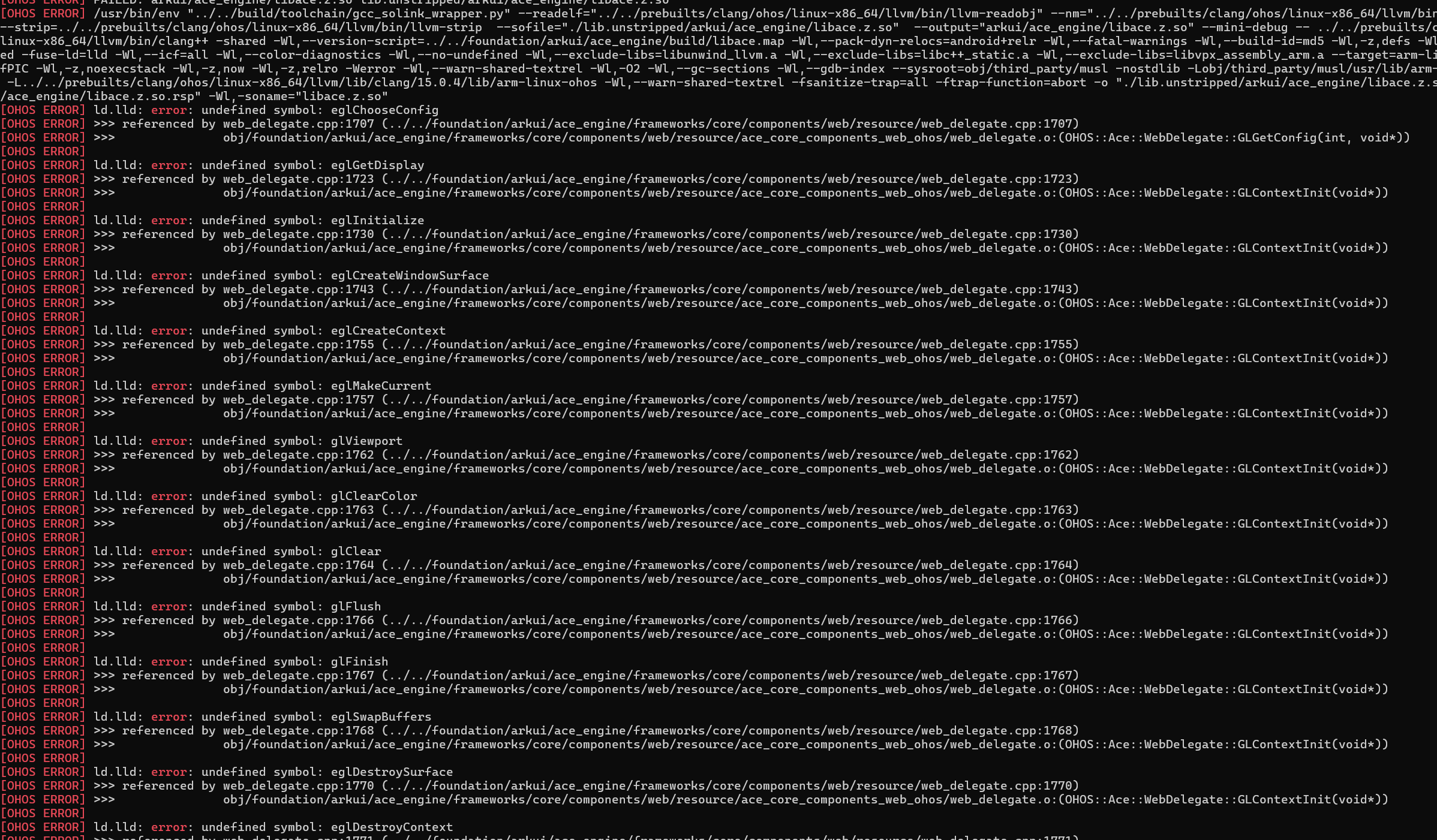
路径二:vendor\hihope\rk3568\config.json
"subsystem": "arkui",
"components": [
{
"component": "ace_engine",
"features": [
"ace_engine_feature_enable_accessibility = true",
"ace_engine_feature_enable_web = false"
]
},
修改代码
修改合成方式
需要注意的有两个:device/soc/rockchip/rk3568/hardware/display/src/display_device/hdi_gfx_composition.cpp路径下的两个接口:
CanHandle接口,
bool HdiGfxComposition::CanHandle(HdiLayer &hdiLayer)
{
DISPLAY_LOGI();
(void)hdiLayer;
return true;
// return false;
}
Apply接口,实现一个简单的合成操作。需要包含display_buffer_vdi_impl.h头文件,否则会报IDisplayBufferVdi相关错误。
int32_t HdiGfxComposition::Apply(bool modeSet)
{
+ StartTrace(HITRACE_TAG_HDF, "HDI:DISP:Apply");
int32_t ret;
- DISPLAY_DEBUGLOG("composer layers size %{public}zd", mCompLayers.size());
+ static std::shared_ptr<IDisplayBufferVdi> g_buffer = nullptr;
+ DISPLAY_LOGD("map composer layers size %{public}zd", mCompLayers.size());
for (uint32_t i = 0; i < mCompLayers.size(); i++) {
HdiLayer *layer = mCompLayers[i];
CompositionType compType = layer->GetCompositionType();
@@ -185,15 +215,39 @@ int32_t HdiGfxComposition::Apply(bool modeSet)
DISPLAY_LOGE("clear layer %{public}d failed", i));
break;
case COMPOSITION_DEVICE:
- ret = BlitLayer(*layer, *mClientLayer);
- DISPLAY_CHK_RETURN((ret != DISPLAY_SUCCESS), DISPLAY_FAILURE,
- DISPLAY_LOGE("blit layer %{public}d failed ", i));
+ // ret = BlitLayer(*layer, *mClientLayer);
+ // DISPLAY_CHK_RETURN((ret != DISPLAY_SUCCESS), DISPLAY_FAILURE,
+ // DISPLAY_LOGE("blit layer %{public}d failed ", i));
+ {
+ if (g_buffer== nullptr) {
+ IDisplayBufferVdi* dispBuf = new DisplayBufferVdiImpl();
+ DISPLAY_CHK_RETURN((dispBuf == nullptr), DISPLAY_FAILURE, DISPLAY_LOGE("map dispBuf init failed"));
+ g_buffer.reset(dispBuf);
+ DISPLAY_LOGD("map new DisplayBufferVdiImpl");
+ }
+ char *clientBuff = (char *)g_buffer->Mmap(mClientLayer->GetCurrentBuffer()->mHandle);
+ if(clientBuff) {
+ DISPLAY_LOGD("map in int");
+ HdiLayerBuffer *hdiLayer = layer->GetCurrentBuffer();
+ char *layerBuff = (char *)g_buffer->Mmap(hdiLayer->mHandle);
+ for(int y = 0; y < hdiLayer->GetHeight(); y++) {
+ memcpy(&clientBuff[mClientLayer->GetCurrentBuffer()->GetStride() *
+ (y + layer->GetLayerDisplayRect().y) + layer->GetLayerDisplayRect().x * 4],
+ (char *)(&layerBuff[hdiLayer->GetStride() * y]), hdiLayer->GetStride());
+ }
+ g_buffer->Unmap(hdiLayer->mHandle);
+ g_buffer->Unmap(mClientLayer->GetCurrentBuffer()->mHandle);
+ } else {
+ DISPLAY_LOGD("map in err");
+ }
+ }
break;
default:
DISPLAY_LOGE("the gfx composition can not surpport the type %{public}d", compType);
break;
}
}
+ FinishTrace(HITRACE_TAG_HDF);
return DISPLAY_SUCCESS;
}
modetest测试
modetest是DRM提供的一个测试工具集,用于检验DRM驱动是否适配成功。
- 为modetest新建BUILD.gn文件
路径:third_party/libdrm/tests/modetest/BUILD.gn:
import("//build/ohos.gni")
ohos_executable("modetest") {
sources = [
"buffers.c",
"cursor.c",
"modetest.c",
]
cflags = [
"-Wno-pointer-arith",
]
include_dirs = [
"../",
".",
]
configs = [ "//third_party/libdrm:libdrm_config" ]
public_configs = [ "//third_party/libdrm:libdrm_public_config" ]
deps = [
"//third_party/libdrm:libdrm",
"//third_party/libdrm/tests/util/:util",
]
public_deps = []
install_images = [
"system",
"updater",
]
part_name = "graphic_2d" #注意
subsystem_name = "graphic"
}
注意:3.2Release中配置为
part_name = "graphic_standard", 而在4.0Release中,由于graphic的代码结构改变,应该配置为part_name = "graphic_2d"。
- 添加依赖
路径:third_party\libdrm\tests\util\BUILD.gn
import("//build/ohos.gni")
ohos_static_library("util") {
sources = [
"format.c",
"kms.c",
"pattern.c",
]
cflags = []
include_dirs = [
"../",
".",
]
configs = [ "//third_party/libdrm:libdrm_config" ]
public_configs = [ "//third_party/libdrm:libdrm_public_config" ]
deps = [
"//third_party/libdrm:libdrm",
]
public_deps = []
}
- 加入编译框架,添加到graphic依赖项
路径:foundation/graphic/graphic_2d/bundle.json
diff --git a/bundle.json b/bundle.json
index 755e6d2..f1bb7ef 100755
--- a/bundle.json
+++ b/bundle.json
@@ -56,6 +56,8 @@
"group_type": {
"base_group": [
"//third_party/libpng:libpng",
+ "//third_party/libdrm/tests/util:util",
+ "//third_party/libdrm/tests/modetest:modetest",
"//foundation/graphic/graphic_2d/interfaces/kits/napi:napi_packages",
"//foundation/graphic/graphic_2d/rosen/modules/composer:libcomposer",
"//foundation/graphic/graphic_2d/rosen/modules/composer/native_vsync:libnative_vsync",
- 解决编译问题
问题1:依赖不可见
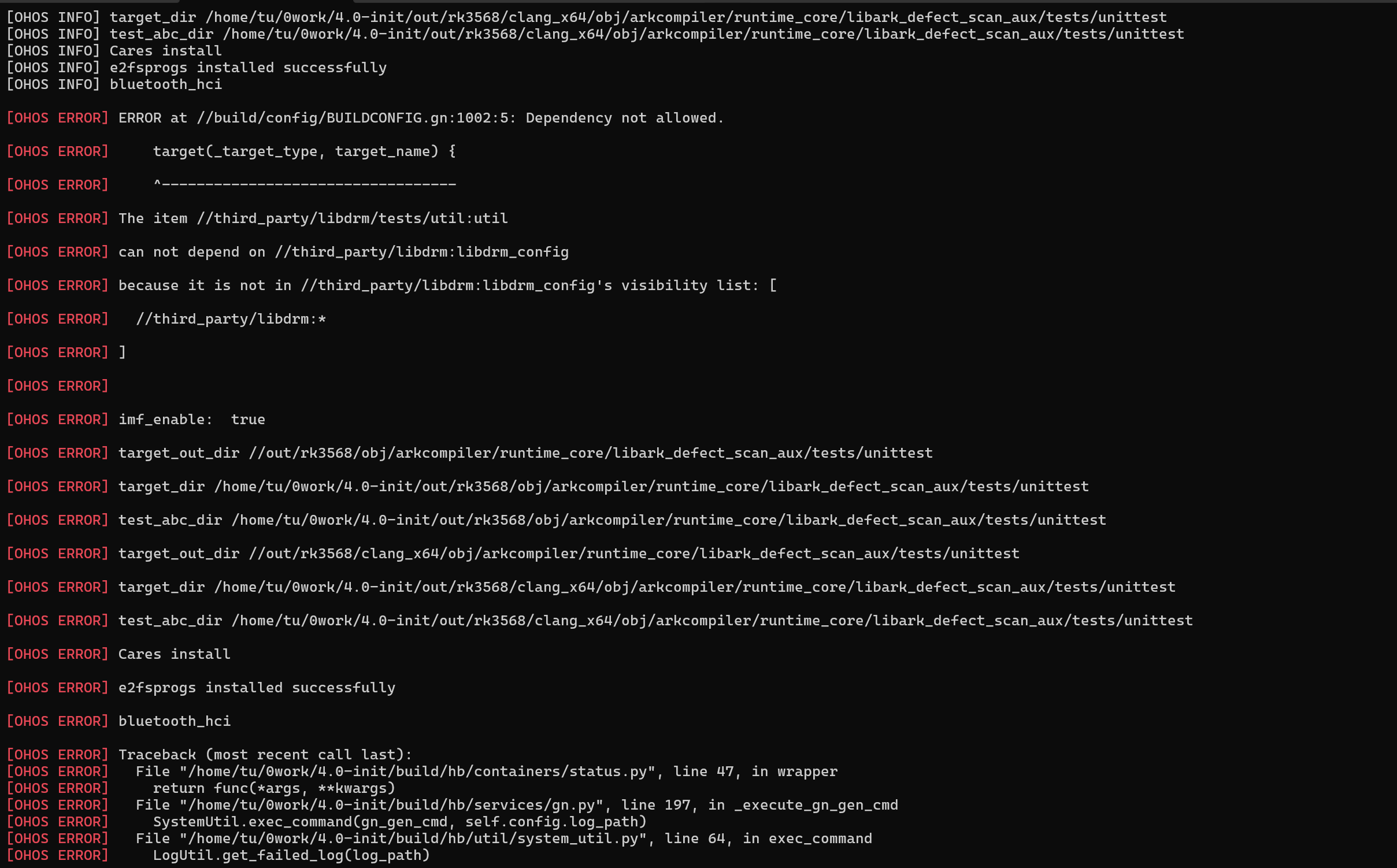
路径:third_party/libdrm/BUILD.gn
修改点:添加util的可见性。
config("libdrm_config") {
visibility = [ ":*",
"tests/util:*",
"tests/modetest:*" ]
......
}
问题2:添加三方库依赖
路径:foundation/graphic/graphic_2d/bundle.json
修改点:third_party添加libdrm、modetest依赖。
{
......
"third_party": [
"flutter",
"libuv",
"openssl",
"libxml2",
"bounds_checking_function",
"icu",
"libpng",
"zlib",
"skia",
"cJSON",
"jsoncpp",
"egl",
"opengles",
"vulkan-headers",
"vulkan-loader",
"libdrm",
"modetest"
]
......
}
注意:4.1Release可能还有build/bundle.json的依赖问题(4.0中没有这个文件),解决方法在此报错的bundle.json中的third_party添加libdrm和util即可。
- 运行测试
编译生成路径:out/yangfan/obj/third_party/libdrm/tests/modetest/modetest
- IOCTL方式
/system/bin/modetest -M rockchip -s 123@68:720x1280
-M 指定drm驱动名称
-s 指定屏幕信息
123:connector id
68: crtc id
720x1280: 屏幕分辨率
- atomic方式(OHOS Display HDI使用的方式)
modetest -M rockchip -D 0 -a -s 123@68:720x1280 -P 54@68:720x1280
-M 指定drm驱动名称
-s 指定屏幕信息
123:connector id
68: crtc id
720x1280: 屏幕分辨率
-P 指定plane信息
54: 可用的plane id
68: crtc id
720x1280: plane大小
由于HDI使用的是atomic方式,我们需要使用atomic方式测试drm接口成功,才能确保HDI正常使用。
- 直接运行modetest可以获取所有参数:
/system/bin/modetest
……
Encoders:
id crtc type possible crtcs possible clones
120 0 Virtual 0x00000003 0x00000001
122 0 TMDS 0x00000001 0x00000002
135 85 DSI 0x00000002 0x00000004
Connectors:
id encoder status name size (mm) modes encoders
123 0 disconnected HDMI-A-1 0x0 0 122
……
如果遍历了所有驱动后都找不到合适的驱动名称就退出了,而无法运行,就需要使用-D来指定dri的名称。
查看dri设备信息
ls -l /dev/dri/by-path/
total 0
lrwxrwxrwx l root system 8 2017-08-07 13:34 platform-display-subsystem-card -> ../card0
lrwxrwxrwx l root system 8 2017-08-07 13:33 platform-display-subsystem-render -> ../renderD128
就可以使用“-D display-subsystem”来替换“-M rockchip”。
modetest -D display-subsystem -a -s 123@68:720x1080 -P 54@68:720x1080
正常情况下会有如下显示:
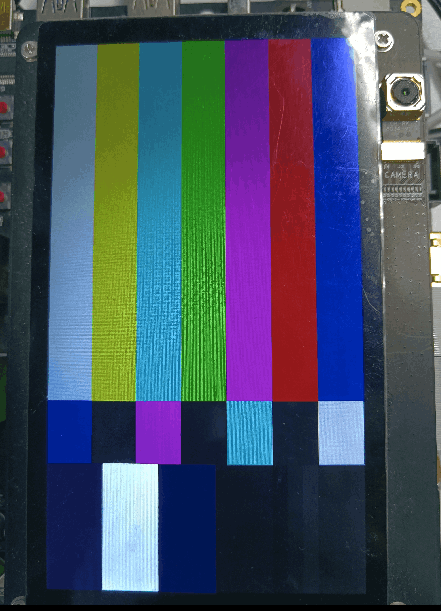
注意:这里的参数 123@68:720x1080 指定的是HDMI屏幕,需要接HDMI显示,如果测试其他屏请按实际情况修改参数。
hello_composer测试
hello_composer是HDI接口的测试工具,用于检验HDI接口是否适配成功。
路径:foundation/graphic/graphic_2d/bundle.json
diff --git a/bundle.json b/bundle.json
index 755e6d2..28bc995 100755
--- a/bundle.json
+++ b/bundle.json
@@ -63,6 +63,7 @@
"//foundation/graphic/graphic_2d/rosen/samples/2d_graphics:drawing_sample_rs",
"//foundation/graphic/graphic_2d/rosen/samples/2d_graphics:drawing_engine_sample",
"//foundation/graphic/graphic_2d/rosen/samples/2d_graphics/test:drawing_sample",
+"//foundation/graphic/graphic_2d/rosen/samples/composer:hello_composer",
"//foundation/graphic/graphic_2d/rosen/modules/effect/effectChain:libeffectchain",
"//foundation/graphic/graphic_2d/rosen/modules/effect/color_picker:color_picker",
"//foundation/graphic/graphic_2d/rosen/modules/effect/skia_effectChain:skeffectchain",
编译生成路径:out/yangfan/packages/phone/vendor/bin/hello_composer
执行./hello_composer
成功会有如下显示:
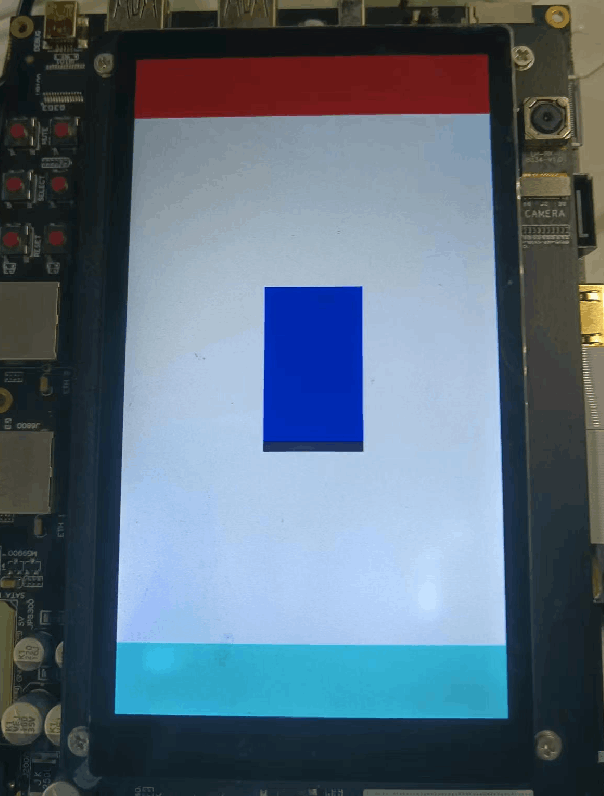
注意:
1.如果不能显示图形,请根据hello_composer的打印,检查hdi接口适配情况。
2.如果是从黑屏慢慢变为蓝屏,需要注意:
CanHandle接口,执行hello_composer需要返回true;进行CPU点屏需要返回false。
Apply接口,合成方式。
问题定位策略
- 确认drm驱动适配是否正常:运行modetest测试,参考前文"modetest测试"章节。
- 确认hdi接口适配是否正常:运行hello_composer测试,参考前文"hello_composer测试"章节。
- 确认图形相关应用、服务是否正常:例如开机后进入不了launcher问题,就需要执行
ps -ef | grep com命令,确保至少com.ohos.launcher和com.ohos.systemui这两个系统应用要启动正常。# ps -ef | grep com root 79 2 0 12:29:15 ? 00:00:00 [kcompactd0] root 207 2 0 12:29:17 ? 00:00:00 [mmc_complete] root 237 2 0 12:29:18 ? 00:00:00 [krfcommd] 10008 1819 311 6 12:29:29 ? 00:00:01 com.ohos.systemui 20010026 2026 311 0 12:29:31 ? 00:00:00 com.ohos.telephonydataability 20010043 2079 311 12 12:29:32 ? 00:00:02 com.ohos.launcher 10006 2099 311 2 12:29:32 ? 00:00:00 com.example.kikakeyboard:inputMethod 20010033 2109 311 1 12:29:32 ? 00:00:00 com.ohos.medialibrary.medialibrarydata root 2223 2216 15 12:29:53 pts/0 00:00:00 grep com. #
问题记录
1. 如果报以下错误,需要将out以及生成的文件全部删除,重新编译。
原因:首次编译成功后,out中会生成一些文件,记录依赖,删除fingerprint_auth组件之后,out中的一些配置文件并没有修改,编译时找不到对应文件导致报错。

2. 运行hello_composer蓝屏。
前文hello_composer章节已经提到过。
3. 播放完开机动画后,不能进入桌面。
问题现象:
- 播放完开机动画后,停留在开机OpenHarmony界面不能进入桌面,但是解锁后点击应用正常出现应用界面。
- 串口和hilog打印中打印如下log:
...... [ 46.572457] audit: type=1400 audit(1501928527.476:334): avc: denied { call } for pid=605 comm="TaskExecutor" scontext=u:r:distributeddata:s0 tcontext=u:r:netmanager:s0 tclass=binder permissive=0 [ 47.084814] audit: type=1400 audit(1501928527.990:335): avc: denied { call } for pid=605 comm="TaskExecutor" scontext=u:r:distributeddata:s0 tcontext=u:r:netmanager:s0 tclass=binder permissive=0 [ 47.352681] audit: type=1400 audit(1501928528.256:336): avc: denied { getopt } for pid=621 comm="render_service" scontext=u:r:render_service:s0 tcontext=u:r:render_service:s0 tclass=unix_dgram_socket permissive=0 [ 47.352762] audit: type=1400 audit(1501928528.256:337): avc: denied { setopt } for pid=621 comm="render_service" scontext=u:r:render_service:s0 tcontext=u:r:render_service:s0 tclass=unix_dgram_socket permissive=0 [ 47.352806] audit: type=1400 audit(1501928528.256:338): avc: denied { getopt } for pid=621 comm="render_service" scontext=u:r:render_service:s0 tcontext=u:r:render_service:s0 tclass=unix_dgram_socket permissive=0 [ 47.596342] audit: type=1400 audit(1501928528.500:339): avc: denied { call } for pid=605 comm="TaskExecutor" scontext=u:r:distributeddata:s0 tcontext=u:r:netmanager:s0 tclass=binder permissive=0 .......
- avc:denied:访问被拒绝。
- permissive=0:处于强制模式,即如果不满足安全策略,就拒绝访问。
问题原因:
推测可能是改用CPU进行点屏之后,此操作不在安全策略范围内,导致安全策略拒绝拉起launcher服务。
由于selinux模块比较复杂,还没搞清楚具体是哪里对launcher产生影响。所以目前给出的解决方案都是以关闭selinux或采用宽容安全策略为主。后续找到关键问题点再优化解决方案。
解决方案
- 临时方案:hdc执行
setforence 0,将安全策略置为宽松策略,重启之后会恢复。 - 修改
config.json配置:vendor目录对应的产品config.json文件中将build_selinux置为false,关闭selinux。 - 修改gni文件:路径
base/security/selinux_adapter/selinux.gni,将selinux_enforce = true置为false,关闭selinux。
参考资料
OpenHarmony中SELinux使用详解_小~Q-Laval社区 (csdn.net)
OpenHarmony SELinux的主代码仓
4. 3588 CPU点屏不显示图形。
不显示图形原因有很多,此案例讲述planetype配置不正确情景,每家芯片厂商实现drm的方式不一样,可能没有下面这些配置,请注意!
路径:device/soc/rockchip/rk3568/hardware/display/src/display_device/drm_plane.cpp
device/soc/rockchip/rk3568/hardware/display/src/display_device/drm_plane.h
struct PlaneTypeName planeTypeNames[] = {
{ DrmPlaneType::DRM_PLANE_TYPE_CLUSTER0_WIN0, "Cluster0-win0" },
{ DrmPlaneType::DRM_PLANE_TYPE_CLUSTER0_WIN1, "Cluster0-win1" },
{ DrmPlaneType::DRM_PLANE_TYPE_CLUSTER1_WIN0, "Cluster1-win0" },
{ DrmPlaneType::DRM_PLANE_TYPE_CLUSTER1_WIN1, "Cluster1-win1" },
{ DrmPlaneType::DRM_PLANE_TYPE_ESMART0_WIN0, "Esmart0-win0" },
{ DrmPlaneType::DRM_PLANE_TYPE_ESMART0_WIN1, "Esmart0-win1" },
{ DrmPlaneType::DRM_PLANE_TYPE_ESMART0_WIN2, "Esmart0-win2" },
{ DrmPlaneType::DRM_PLANE_TYPE_ESMART0_WIN3, "Esmart0-win3" },
{ DrmPlaneType::DRM_PLANE_TYPE_ESMART1_WIN0, "Esmart1-win0" },
{ DrmPlaneType::DRM_PLANE_TYPE_ESMART1_WIN1, "Esmart1-win1" },
{ DrmPlaneType::DRM_PLANE_TYPE_ESMART1_WIN2, "Esmart1-win2" },
{ DrmPlaneType::DRM_PLANE_TYPE_ESMART1_WIN3, "Esmart1-win3" },
{ DrmPlaneType::DRM_PLANE_TYPE_SMART0_WIN0, "Smart0-win0" },
{ DrmPlaneType::DRM_PLANE_TYPE_SMART0_WIN1, "Smart0-win1" },
{ DrmPlaneType::DRM_PLANE_TYPE_SMART0_WIN2, "Smart0-win2" },
{ DrmPlaneType::DRM_PLANE_TYPE_SMART0_WIN3, "Smart0-win3" },
{ DrmPlaneType::DRM_PLANE_TYPE_SMART1_WIN0, "Smart1-win0" },
{ DrmPlaneType::DRM_PLANE_TYPE_SMART1_WIN1, "Smart1-win1" },
{ DrmPlaneType::DRM_PLANE_TYPE_SMART1_WIN2, "Smart1-win2" },
{ DrmPlaneType::DRM_PLANE_TYPE_SMART1_WIN3, "Smart1-win3" },
{ DrmPlaneType::DRM_PLANE_TYPE_Unknown, "unknown" },
};
-
如果缺少Smart0和Smart1两个图层配置,会导致rk系列平台,在4.0版本上卡在内核logo显示界面;在4.1版本上卡在内核logo一段时间后,反复重启。
-
Cluster图层与鼠标相关,如果缺少Cluster图层则会导致如下情况:
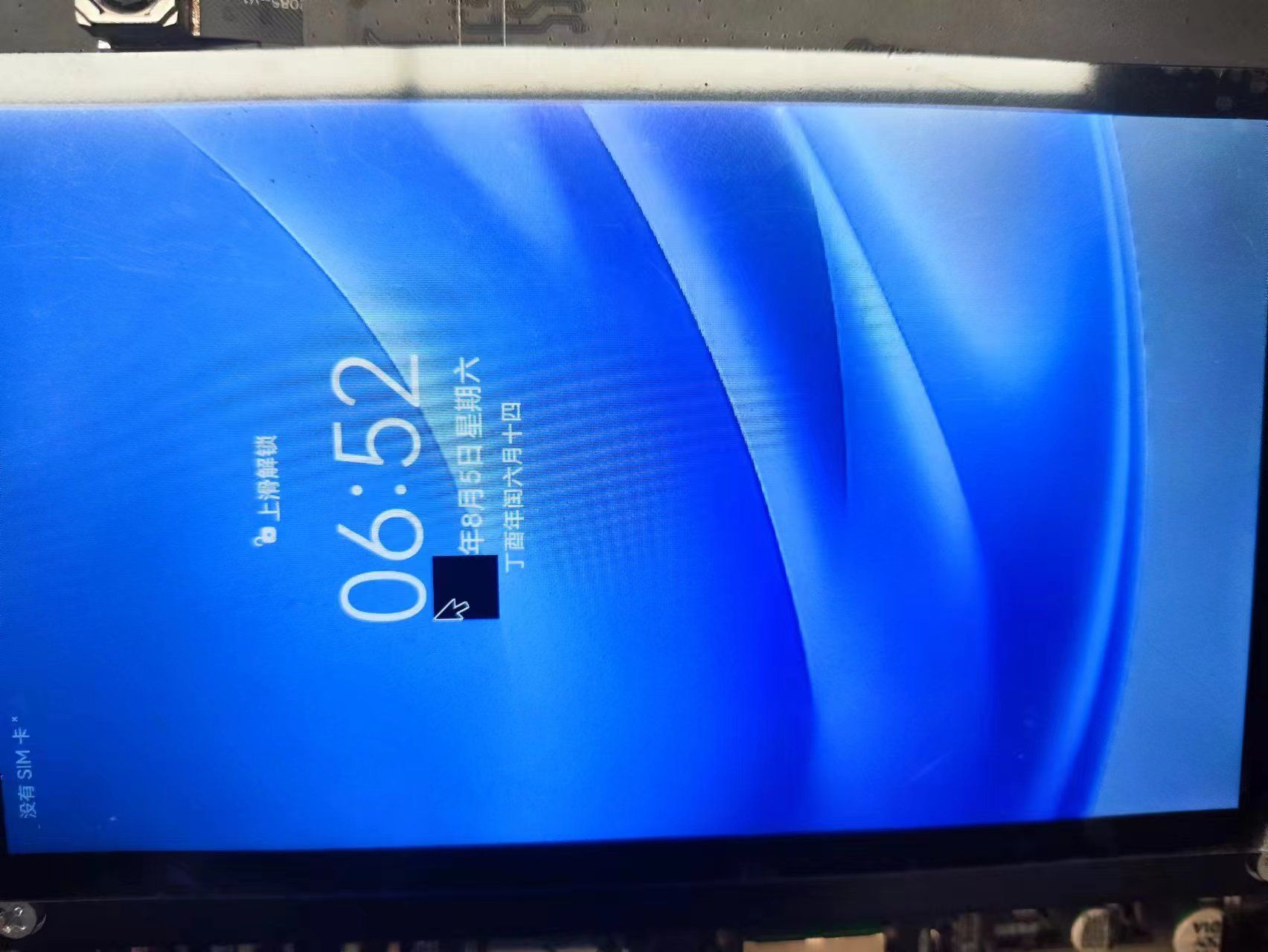
更多推荐
 已为社区贡献10条内容
已为社区贡献10条内容






所有评论(0)